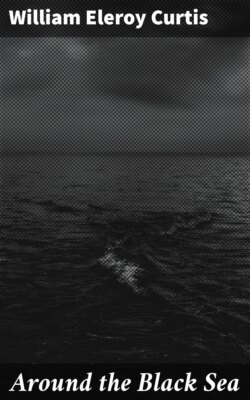Читать книгу Around the Black Sea - William Eleroy Curtis - Страница 5
На сайте Литреса книга снята с продажи.
ОглавлениеThe city of Batoum
The new town is distinctly Russian, with wide streets, good sidewalks, and shade trees everywhere. There are two well-kept parks, a boulevard and promenade along the seashore which is very attractive and must be a great comfort to the population during the long, hot summer months. There is a good deal of bathing au naturel, the women undressing and going into the water “in the altogether” at one end of the promenade, and the men at the other, without the formality of bathing-houses, although they might be built at a very slight expense in the interest of common decency as well as convenience. No other necessity is neglected.
It was decidedly pleasant to see the unveiled faces of women again, after several weeks in Mohammedan towns; and one never admires blonde hair and blue eyes, particularly when worn by an American girl, as he does after spending some time among Orientals. It was pleasant to escape the musty smells which are attached to every Turkish town and to see healthy, clean dogs that could be touched without contamination.
Batoum has a splendid cathedral of the solid and ornate Russian style of architecture, with the five domes required by Byzantine traditions. It was erected as a memorial several years ago. Somebody, unfortunately, furnished the cathedral with a peal of heavy, deep-toned bells, which are ringing nearly all the time and cause a suspension of business, because nobody can talk or hear or even think in the eruption of sound they produce. There are good shops, well filled with modern merchandise, and a hotel that is quite comfortable, but is kept by a man whose name might be Barabbas, for he is a robber.
The streets and cafés are full of Russian officers and soldiers, including many stately Cossacks wearing tall chimney-pot hats of white Persian lamb and the many other accoutrements that pertain to that race of professional warriors. A Cossack, as perhaps you know, comes from the valley of the river Don, in eastern Russia, where soldiers are bred, and they go into the Russian army for life, furnishing their own uniforms, their own horses, and their own arms, as well as their own rations and supplies, for which they receive a lump sum per month. They are doubtless the finest cavalry in the world and are absolutely loyal to their employers. It is a matter of principle and not a matter of partisanship. In all the Russian revolutions, in all the conspiracies against the czar and the government, no Cossack has ever been corrupted. On the other hand, they are absolutely merciless. They seem to be entirely without the ordinary feelings of humanity, knowing neither sympathy nor sorrow, regret nor remorse. They will shoot an infant as readily as an armed foe.
The Russian drosky, the little baby victoria, so familiar to the czar’s possessions, which may be found in every town between Riga and Vladivostock, is here at the convenience of the tourist as well as the residents. We saw a few of the splendid black stallions, with long tails and manes, that were introduced into Russia during the reign of Catherine II by Prince Orloff, whose descendants now own the largest and most celebrated stock farm in the world, although I believe it was badly used by the revolutionists several years ago. The ishvostchik, as a drosky driver is called, is another distinctively Russian institution and we were very glad to see him again.
The constitution of Russia hasn’t made any difference with the vigilance of the police, and it seemed as if the passengers of the good ship Euterpe were subjected to more than ordinary scrutiny by the police before they would allow us to land. The captain made the dock at daylight, which at that time of year is about five o’clock in the morning, and shortly before six o’clock all the passengers were awakened and invited to the salon. There we found a police officer with a couple of clerks examining passports. After we had presented ours and had explained our motives in visiting Russia, we were gruffly dismissed, but it was after nine o’clock before they would allow us to land. In the meantime they examined our luggage with great care in order, as were advised, to make sure that we were not importing arms or anarchistic literature to corrupt the Caucasians. When the examination was about half finished, I showed the chief inquisitor a general letter of introduction given me by the Russian ambassador at Washington, certifying to my respectability and innocence. He read it through carefully, scowled fiercely, shook his head, and then began to search more energetically than before, regardless of ambassadors or other outside influences who have nothing to do with the case. But we are taught that there is good in everything, and contact with Russian police officials certainly cultivates patience if nothing else.
